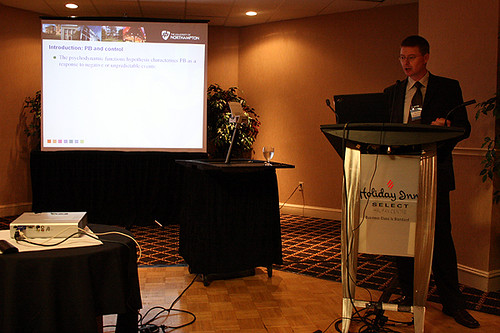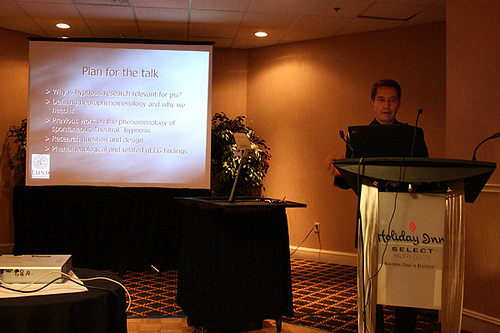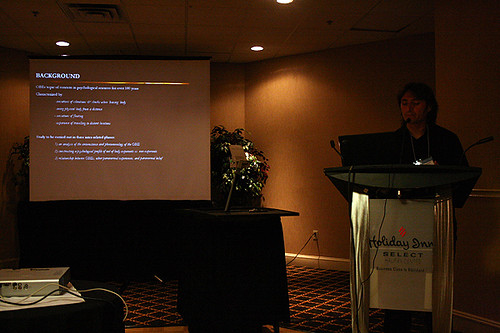 After the morning coffee break, the 50th Annual PA Convention resumed with a session titled Psychological Variables. Professor Chris Roe
After the morning coffee break, the 50th Annual PA Convention resumed with a session titled Psychological Variables. Professor Chris Roeof the Centre for the Study of Anomalous Psychological Processes at the University of Northampton, UK opened the session by presenting his latest research on Paranormal Belief, Anxiety, and Perceived Control over Life Events. Roe and his coauthor, Claire Bell investigated the hypothesis that paranormal beliefs develop to allay the anxiety of living in an unpredictable and uncontrollable world by offering the promise of order and personal power. Although there is evidence from previous research to support an association between of perceived helplessness, anxiety and paranormal belief, they had not previously been considered together in the same group of participants. Roe and Bell asked 65 participants to complete a battery of questionnaires designed to measure state-trait anxiety, paranormal belief, and participants' estimates of the likelihood of stressful events in their lives as well as their perceived control over those stressful events. No relationship was found between perceived control over stressful life events and paranormal beliefs, but measures of state-trait anxiety correlated significantly with both perceived control and paranormal belief. The authors suggest a model that is broadly in agreement with the hypothesis that paranormal beliefs may develop in some people as a response to anxiety that is evoked by the perception that the world is chaotic and unpredictable.
 Dr. Etzel Cardeña of the Center for Research on Consciousness and Anomalous Psychology (CERCAP) at Lund University, Sweden presented a study authored by himself and several CERCAP members titled The Neurophenomenology of Hypnosis. In their study, the authors followed a neurophenomenological approach by analyzing hypnotic experiences parallel to brain processes. The lab selected a group of participants with high, medium, and low hypnotizability and evaluated their cortical activity while the participants responded to various suggestions and spoke aloud their mentations. Analyses using both quantitative and qualitative measures showed that individuals with high, medium, and low levels of hypnotizability experience hypnosis in very different ways. While the experience of low hypnotizables was characterized by normal mentation, that of medium hypnotizables was centered more on bodily sensations and the mentations of highs were characterized by positive affect and mystic-like phenomena. EEG analyses also corroborated differences in brain functioning across levels of hypnotizability. The authors hypothesize that the experiences of highs in "deep" hypnosis is more likely to be conducive to psi phenomena.
Dr. Etzel Cardeña of the Center for Research on Consciousness and Anomalous Psychology (CERCAP) at Lund University, Sweden presented a study authored by himself and several CERCAP members titled The Neurophenomenology of Hypnosis. In their study, the authors followed a neurophenomenological approach by analyzing hypnotic experiences parallel to brain processes. The lab selected a group of participants with high, medium, and low hypnotizability and evaluated their cortical activity while the participants responded to various suggestions and spoke aloud their mentations. Analyses using both quantitative and qualitative measures showed that individuals with high, medium, and low levels of hypnotizability experience hypnosis in very different ways. While the experience of low hypnotizables was characterized by normal mentation, that of medium hypnotizables was centered more on bodily sensations and the mentations of highs were characterized by positive affect and mystic-like phenomena. EEG analyses also corroborated differences in brain functioning across levels of hypnotizability. The authors hypothesize that the experiences of highs in "deep" hypnosis is more likely to be conducive to psi phenomena. The final presentation of the session was given by David Wilde, a Ph.D. student at the School of Psychological Sciences at the University of Manchester, UK. Wilde discussed the plans for a program of study on The Occurence, Phenomenology, and Psychological Correlates of Out-of-Body and Near Death Experience. The objectives of such research are to elicit phenomenological detail regarding the circumstances surrounding OBE occurences, develop a psychological theory of the OBE, examine the relationship between OBE's and other paranormal experiences and belief, and develop novel methods of the data collection and analysis in parapsychological research. This ambitious project is being undertaken through several phases of research; interviewing participants, data collection through surveys, and finally the participation of OBE experiencers in a web environment.
The final presentation of the session was given by David Wilde, a Ph.D. student at the School of Psychological Sciences at the University of Manchester, UK. Wilde discussed the plans for a program of study on The Occurence, Phenomenology, and Psychological Correlates of Out-of-Body and Near Death Experience. The objectives of such research are to elicit phenomenological detail regarding the circumstances surrounding OBE occurences, develop a psychological theory of the OBE, examine the relationship between OBE's and other paranormal experiences and belief, and develop novel methods of the data collection and analysis in parapsychological research. This ambitious project is being undertaken through several phases of research; interviewing participants, data collection through surveys, and finally the participation of OBE experiencers in a web environment.Following the presented papers, the convention recessed for lunch, with two sessions on mediumship for attendees to look forward to in the afternoon.

1 comment:
Great gathering. I wish I had been there
Post a Comment